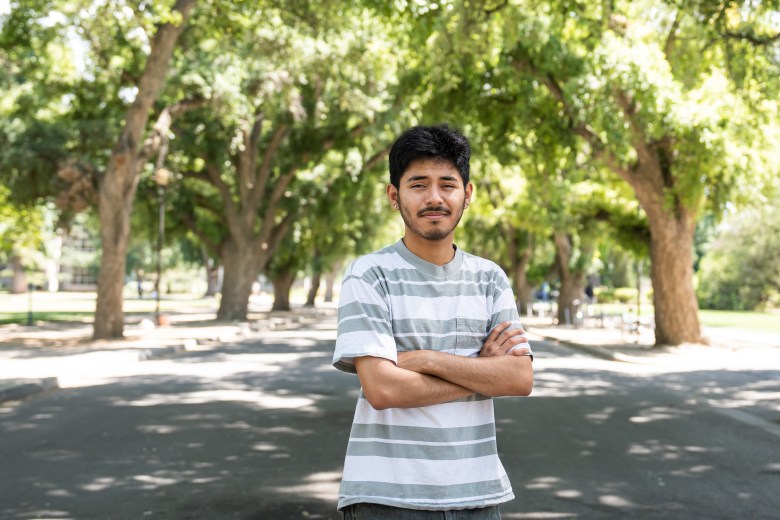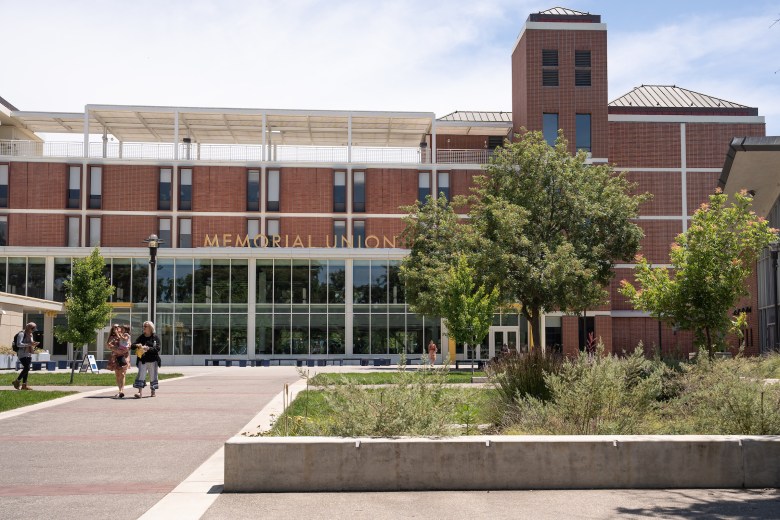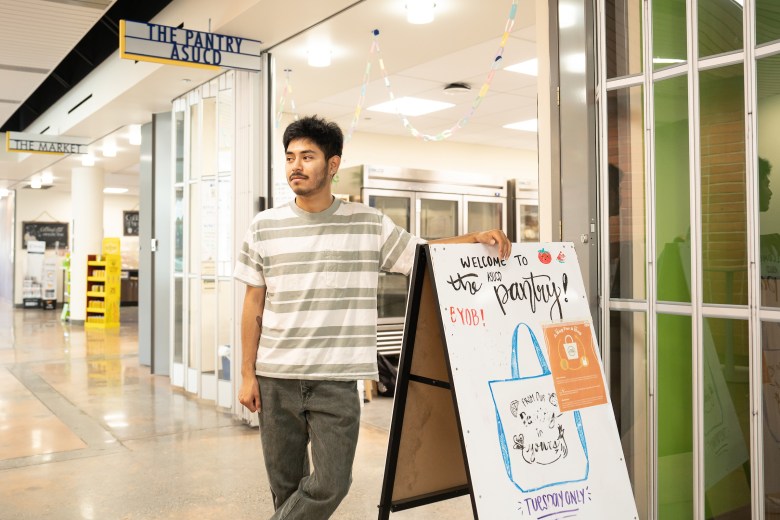
Get crucial education news and analysis provided directly to your inbox
Sergio Bocardo-Aguilar was starving. A first-year trainee at the University of California, Davis, he operated at a fast-casual dining establishment, however still could not pay for food. After his shifts, he would ask his pals for treats or leftovers. Some nights he went right to sleep rather of having supper.
Bocardo-Aguilar questioned if public support programs might assist him. However he didn’t get approved for the federal Supplemental Nutrition Help Program, called breeze or food stamps. He worked 2 less hours weekly than the program needed– 18 rather of 20.
Due to the fact that it’s tough to put in that much time on top of a complete course load, “the work-hour requirement is truly bothersome, particularly for a great deal of trainees, like me,” he stated. “I certainly believe it needs to be gotten rid of, particularly for trainees.”

That work guideline was loosened up for trainees throughout the peak of Covid-19 however has actually now been reimposed; a minimum of one member of Congress states that almost a million trainees are at threat of losing breeze advantages as an outcome.
Now, under the offer to avoid a default on the nationwide financial obligation, more work guidelines are being contributed to SNAP and other advantages programs. Supporters state that these kinds of limitations are hindering Americans from going to college and getting higher-wage tasks.
Federal advantages programs are mainly developed to omit university student. Even if they satisfy breeze’s earnings requirements– less than $1,473 monthly for a bachelor– university student do not get approved for advantages unless they work 20 hours on top of going to classes or satisfy other conditions such as taking care of a reliant kid under age 6.
Not just does this leave trainees starving, state specialists and supporters, it prevents breeze receivers who are not currently in college from registering.
Related: How the pledge of totally free college does not constantly assist low-income trainees
College graduates with an associate degree make usually 25 percent more over their life times than individuals with just a high school diploma, and bachelor’s degree receivers get the type of tasks in which they usually make 75 percent more, according to the Georgetown Center on Education and the Labor Force Altering breeze guidelines to motivate education, instead of simply work, might assist more individuals enhance their scenarios, critics state.
” College is labor force advancement,” stated Carrie Welton, who directs fundamental requirements and anti-poverty policy at The Institute for College Gain Access To & & Success.” Federal government programs ought to be the last entity that needs to be limiting things that we understand work.”
As states attempt to increase the variety of grownups with degrees and qualifications, supporters state reducing work requirements for programs like breeze, a minimum of where trainees are included– instead of the existing pattern of including more– might put receivers on a course to success and make them less most likely to require federal government support in the future.

” If these people have the ability to get these qualifications, these bachelor’s degrees and other occupation qualifications, they might leave these public advantages and have the ability to get to a family-sustaining wage,” stated David Croom, associate director for postsecondary success for moms and dads at the Aspen Institute. “We wish to incentivize individuals getting premium qualifications fairly rapidly in an inexpensive method.”
BREEZE isn’t the only program that supporters state prevents education in favor of work.
Take the federal Temporary Help for Needy Households program, or TANF: States have freedom over how they carry out the program, however a particular portion of TANF receivers in each state requirement to be working to satisfy federal guidelines. That suggests organizers prevent directing a lot of receivers into education, stated Bryce McKibben, senior director of policy and advocacy at the Hope Center for College, Neighborhood and Justice at Temple University.
” The federal financial assistance system, like Pell Grants and our trainee loan program and state and institutional help– those programs are meant to assist the most low-income folks in our nation make their dreams possible,” McKibben stated. However eligibility limitations “make it so that those folks would have extremely serious effects on their own or their households if they wished to enlist in college.”
Related: Why are rates increasing more for lower-income university student than their higher-income peers?
The concentrate on getting program receivers used comes mainly from a desire to make them self-dependent and no longer in requirement of help. However specialists state that a degree or credential might assist attain that while producing other financial advantages for states.
Parker Gilkesson formerly dealt with individuals in North Carolina to identify their eligibility for programs such as TANF. In a few of the state’s counties, leaving a task or lowering hours to participate in college is particularly singled out as a factor TANF receivers might lose their advantages.
In her experience, the policy “would simply require individuals to press education to the side and go on and get a lower-wage task and perpetuate a cycle,” stated Gilkesson, now a senior policy expert at the Center for Law and Social Policy.

For existing trainees, the work requirements can make it harder to do well in school and graduate. Trainees who work while in college are 20 percent less most likely to complete their degrees than schoolmates who do not, according to brand-new research study.
” It does remove from their scholastic research studies,” stated Brandi Simonaro, who co-directs breeze outreach for public colleges as a task director at the Center for Healthy Neighborhoods at California State University’s Chico school.
When she was a trainee, Simonaro was on CalFresh, the state’s breeze program. Working more than 20 hours, as needed to continue getting advantages, “truly impacted my capability to be present on school,” she stated. “Going to workplace hours was a battle.”
Aaron Kunst, another co-director of the outreach program, stated he dealt with a trainee who was both homeless and used, however still stopped working to satisfy eligibility requirements for CalFresh.
Outreach organizers like Simonaro and Kunst can assist trainees browse the sometimes-dizzying experience of obtaining federal advantages. Typically, trainees believe they are disqualified, even if they’re not, as federal government sites paint a frustrating photo. Without assistance, the intricacy of the requirements and the variety of hoops trainees should leap through, consisting of an interview, can end up being barriers to gain access to.
Trainees who work while in college are 20 percent less most likely to complete their degrees than schoolmates who do not.
” The majority of people are simply visiting the list of guidelines and resemble, ‘Forget it. I simply do not have time to handle that administration,'” stated McKibben. As an outcome, they select not to participate in college or obtain advantages.
Ivan Roberts, a trainee at Bowie State University in Maryland, stated he thinks he has actually been qualified for breeze, however does not understand where to turn for assistance in using. He has actually obtained breeze 3 times however has actually never ever heard back. Without assistance, he has actually needed to select in between paying to fix hangs on his trainee tuition account or purchasing food. That has actually obstructed of his scholastic development, he stated.
” If I had the cash to look after school and the cash to sustain myself simply to satisfy my specific requirements, a great deal of the issues I did have with school would have never ever developed,” Roberts stated.
Related: The current group to get unique attention from college admissions workplaces: males
Throughout the peak of the pandemic, trainees had the ability to get support if they were authorized for work research study or if their moms and dads were not anticipated to contribute economically to their educations. However with the general public health emergency situation stated over, those exceptions ended on June 10.
And although the financial obligation ceiling offer in between the Biden administration and congressional Republican politicians will broaden access to SNAP for young people who age out of foster care, it will likewise raise from 50 to 54 the age at which older grownups getting breeze are needed to work and make it harder for states to exempt households of any age getting TANF from the work requirement.
Politicians generally do not wish to be seen extending advantages to trainees who appear bad however are being supported by their households, supporters state. Advantages programs are likewise a few of the most expensive federal efforts.
” The trainee guidelines were put in in the ’70s over issues that upper- and middle-income kids, who looked briefly bad since they remained in college however were in fact being economically supported by their moms and dads, would have the ability to gain access to breeze,” stated Welton. “A few of those issues are I seem like not just a red herring however likewise relatively unproven in regards to what the information inform us.”
” Federal government programs ought to be the last entity that needs to be limiting things that we understand work.”
Carrie Welton, The Institute for College Gain Access To & & Success
Over half of all university student are thought about independent, according to an analysis by the Institute for Women’s Policy Research study. Almost 30 percent of those at four-year colleges knowledgeable food insecurity throughout the pandemic, the Hope Center reports.
” Today’s trainees are not the conventional trainees of years past,” stated Satra Taylor, who directs college and labor force policy and advocacy at Young Invincibles, a company concentrated on youths. “They’re independent, they’re trainee moms and dads, they’re undocumented.”
Amelia Federico, who utilizes the pronoun they, is a trainee at Metropolitan State University of Denver who has actually been getting breeze advantages considering that March. Federico works, however stated they do not understand if they’ll have the ability to continue getting breeze when requirements for trainees are reimposed.
” That would include a lot more tension onto my plate that I rather honestly do not have the space for,” Federico stated. “It would leave a huge concern in my mind of, ‘How am I going to get food?’ “
Some policymakers are dealing with broadening eligibility. U.S. Rep. Jimmy Gomez, D-Cal., reestablished a costs last month that would eliminate breeze’s work requirement for trainees. The expense, called the EATS Act, for Enhance Access to SNAP, deals with an uphill struggle in Congress.
A number of states have actually picked to attempt to assist advantages receivers get as much education as they can while remaining within federal standards. In Kentucky, for example, a program called Ready to Work employees TANF recipients to enlist in the state’s technical and neighborhood colleges. The program supports work-study positioning so receivers and the state can satisfy the requirements under the law.
Even if they satisfy breeze’s earnings requirements, university student do not get approved for advantages unless they work 20 hours (on top of going to classes) or satisfy other conditions.
” The state of Kentucky decided in advance to motivate their TANF customers to benefit from education and training as a path out of hardship,” stated Shauna King-Simms, director of the program.
Retention rates for Ready to Work trainees amount to or much better than those of other trainees, King-Simms stated, although TANF customers are moms and dads with extremely low earnings (a two-person Kentucky household requires to earn less than $ 1,021 monthly to get TANF).
Federico, too, believes education can be a course to financial stability. However when the option is in between going to classes or the food bank, doubt starts to sneak in.
” There have been times where I resemble, ‘Is this worth it?’ “
This story about food stamps for trainees was produced by The Hechinger Report, a not-for-profit, independent wire service concentrated on inequality and development in education. Register for our college newsletter